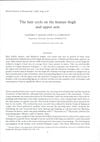 October 2024 in “Journal of the Endocrine Society”
October 2024 in “Journal of the Endocrine Society” Estrogen alone may effectively suppress testosterone in some transfeminine individuals.
102 citations,
July 2020 in “International journal of molecular sciences” Hormones like testosterone and estrogen significantly affect hair growth and structure.
[object Object]  2 citations,
October 2021 in “Exploration of targeted anti-tumor therapy”
2 citations,
October 2021 in “Exploration of targeted anti-tumor therapy” Breast cancer hormone therapy can cause hair loss, which can be treated with daily applications of specific topical solutions like minoxidil and hydrocortisone butyrate.
 1 citations,
July 2021 in “Clinical and Experimental Dermatology”
1 citations,
July 2021 in “Clinical and Experimental Dermatology” Finasteride helps reduce hidradenitis suppurativa symptoms in females.
 January 2016 in “Springer eBooks”
January 2016 in “Springer eBooks” Understanding drug interactions, side effects, and patient-specific factors is crucial for effective dermatological care.
 21 citations,
January 2012 in “Annals of Dermatology”
21 citations,
January 2012 in “Annals of Dermatology” 17α-Estradiol solution safely improves hair density and thickness in female pattern hair loss.
 6 citations,
January 2017 in “Annals of Dermatology”
6 citations,
January 2017 in “Annals of Dermatology” Combination of 17α-estradiol and minoxidil improves hair growth and reduces hair loss in most patients.
 July 1989 in “British Journal of Dermatology”
July 1989 in “British Journal of Dermatology” Women's acne improvement with antibiotics is not linked to signs of high male hormones.
 January 2019 in “Springer eBooks”
January 2019 in “Springer eBooks” PRP and LLLT can improve hair growth in AGA, but more research needed.
 71 citations,
May 1991 in “Clinical and Experimental Dermatology”
71 citations,
May 1991 in “Clinical and Experimental Dermatology” Young men with male pattern baldness lose hair density over time without treatment.
 56 citations,
January 2007 in “Pharmaceutical Development and Technology”
56 citations,
January 2007 in “Pharmaceutical Development and Technology” Liposomes improve finasteride delivery for hair loss treatment, making it a promising option for topical use.
 27 citations,
December 2001 in “Clinical and experimental dermatology”
27 citations,
December 2001 in “Clinical and experimental dermatology” Different hair removal methods have pros and cons, and more evidence is needed to prove laser treatments work.
 17 citations,
August 2002 in “Dermatologic Surgery”
17 citations,
August 2002 in “Dermatologic Surgery” Fluridil safely promotes hair growth in men with androgenetic alopecia.
 8 citations,
January 1987 in “Gynecological Endocrinology”
8 citations,
January 1987 in “Gynecological Endocrinology” Flutamide, an antiandrogen, has minimal impact on female rat endocrine systems and does not significantly change their reproductive cycles.
 1 citations,
January 2015 in “Springer eBooks”
1 citations,
January 2015 in “Springer eBooks” AGA is a common hair loss disorder, and early diagnosis and treatment with minoxidil or finasteride can help reduce emotional distress.
 August 2002 in “Dermatologic Surgery”
August 2002 in “Dermatologic Surgery” Fluridil safely promotes hair growth in men with androgenetic alopecia.
 149 citations,
June 2002 in “British Journal of Dermatology”
149 citations,
June 2002 in “British Journal of Dermatology” Minoxidil works better for female hair loss, but cyproterone reduces scalp oiliness and causes menstrual issues.
 134 citations,
April 2020 in “Journal of Cosmetic Dermatology”
134 citations,
April 2020 in “Journal of Cosmetic Dermatology” Male pattern hair loss could hint at androgens affecting COVID-19 severity.
 124 citations,
January 1993 in “The Prostate”
124 citations,
January 1993 in “The Prostate” Finasteride effectively inhibits 5α reductase, while plant extracts like Permixon and Bazoton don't show significant results.
 81 citations,
June 2010 in “Journal of Dermatological Treatment”
81 citations,
June 2010 in “Journal of Dermatological Treatment” The document concludes that minoxidil and finasteride are proven for hair growth, herbal remedies show promise, but more research is needed to confirm their effectiveness.
 75 citations,
July 2013 in “The Journal of Clinical Endocrinology and Metabolism”
75 citations,
July 2013 in “The Journal of Clinical Endocrinology and Metabolism” Taking low-dose spironolactone and metformin together works better for PCOS symptoms than either drug alone.
 70 citations,
February 2015 in “Expert Opinion on Drug Discovery”
70 citations,
February 2015 in “Expert Opinion on Drug Discovery” Topical drugs and near-infrared light therapy show potential for treating alopecia.
 67 citations,
July 1985 in “British journal of dermatology/British journal of dermatology, Supplement”
67 citations,
July 1985 in “British journal of dermatology/British journal of dermatology, Supplement” Men's thigh hair grows longer and has a longer growth cycle than women's, but arm hair growth is similar between genders.
 57 citations,
August 1995 in “British Journal of Dermatology”
57 citations,
August 1995 in “British Journal of Dermatology” Acne severity is linked to higher levels of certain androgenic hormones, even when those levels are within the normal range.
 55 citations,
July 2016 in “Dermatologic Therapy”
55 citations,
July 2016 in “Dermatologic Therapy” Multiple treatments work best for hair loss.
55 citations,
March 2000 in “American journal of clinical dermatology” Antiandrogens, particularly flutamide and CPA, are most effective for treating hirsutism, with long-term use needed for best results.
[object Object]  48 citations,
May 2008 in “Drug Discovery Today: Disease Mechanisms”
48 citations,
May 2008 in “Drug Discovery Today: Disease Mechanisms” Hair follicles offer promising targets for delivering drugs to treat hair and skin conditions.
 42 citations,
April 2011 in “European Journal of Dermatology”
42 citations,
April 2011 in “European Journal of Dermatology” Early balding men may have insulin resistance, but lifestyle changes can help.
 36 citations,
November 2020 in “Journal of The European Academy of Dermatology and Venereology”
36 citations,
November 2020 in “Journal of The European Academy of Dermatology and Venereology” 5-alpha-reductase inhibitors may reduce COVID-19 symptoms in bald males.
 34 citations,
November 2017 in “Gynecological Endocrinology”
34 citations,
November 2017 in “Gynecological Endocrinology” A transwoman developed a brain tumor after nine years of hormone therapy, suggesting a possible link between the treatment and tumor development.




























